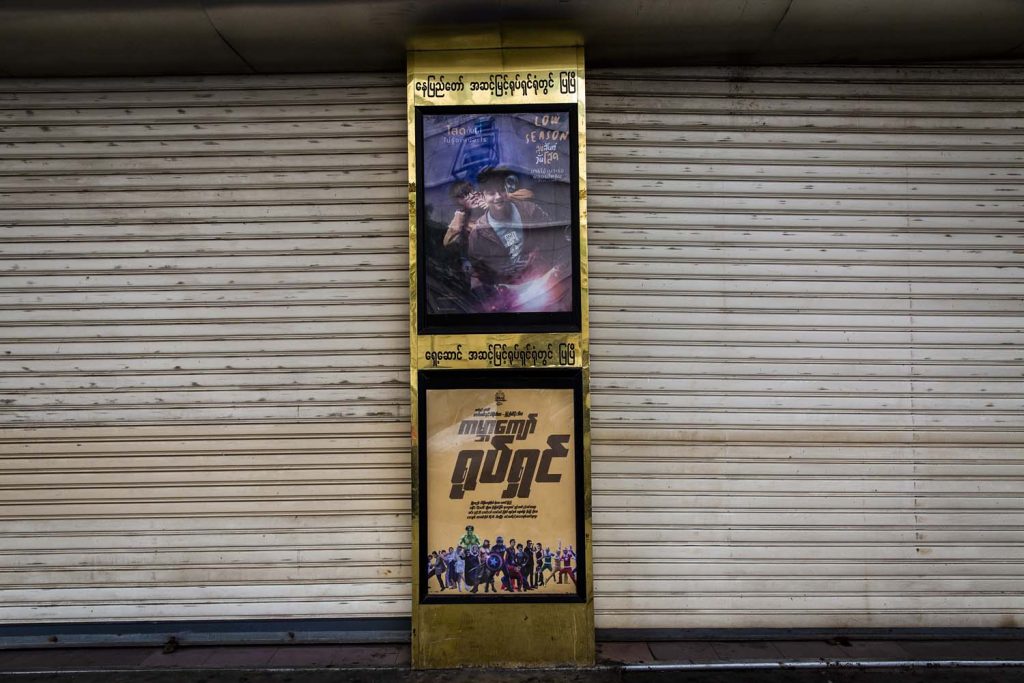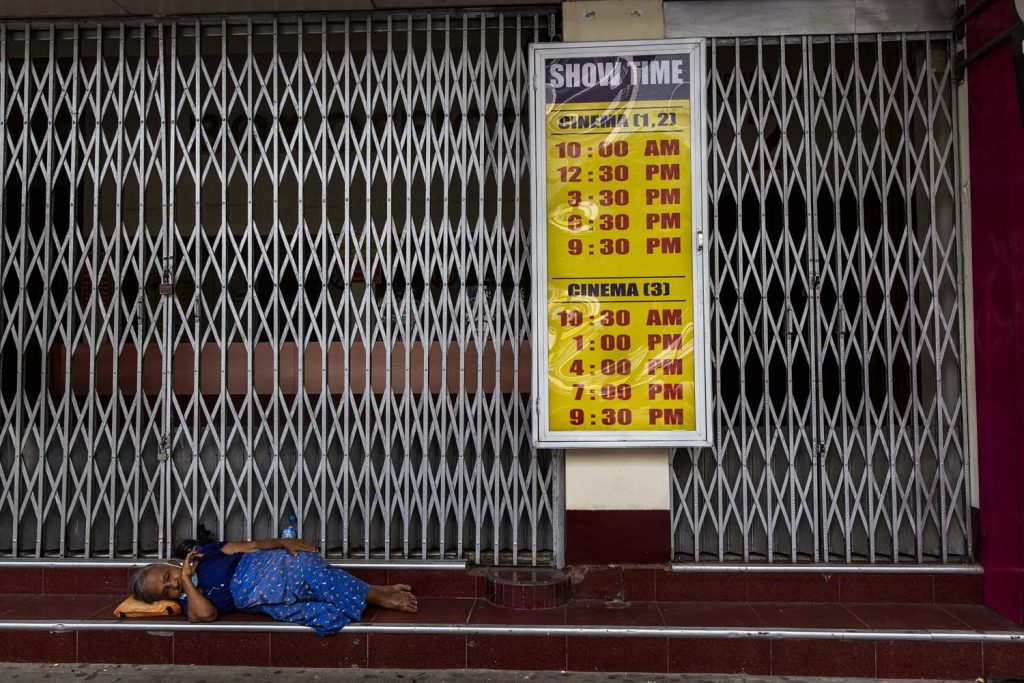The film industry was dealing with a huge backlog of movies and questions about box office takings and tax evasion. Then came COVID-19.
By MYINT MYAT THU | FRONTIER
Even at the best of times, the outlook for Myanmar’s lacklustre film industry is clouded by secrecy over box office takings and a huge backlog of movies, and yet nothing has shaken the sector like the coronavirus pandemic.
As a preventive measure against the virus, the Ministry of Information ordered the closure of cinemas nationwide on March 16. On July 28, Minister of Health and Sports Dr Myint Htwe said cinemas could likely open within three weeks, so long as the count of COVID-19 cases remains low.
The comments came in a publicly-streamed videoconference between the health minister and State Counsellor Daw Aung San Suu Kyi, Myanmar Motion Picture Organization Chairman U Nyi Nyi Tun Lwin and U Zaw Min, chairman of the Mingalar Cinema Group. The day before that conference, a band on filming had been lifted and a new, bureaucratic approvals process instated for productions.
Guidance on safe reopening procedures is forthcoming from the health ministry, which is first conducting health and safety inspections at cinemas, the minister said – though, without a ticket sold or a movie screened in months, authorities and cinema owners have had plenty of time to plan a safe reopening.
Cinema owners are begging authorities to allow them to resume screening as soon as possible, even if at 50 percent capacity to allow for social distancing, as Zaw Min suggested during the conference call.
Many film producers claim that COVID-19 has left production companies struggling to survive but observers are sceptical of their claim. For wealthy producers and cinema owners, “an elephant which is losing weight still looks like a giant buffalo”, said online film critic Ko Zin Ko Ko.
But don’t confuse a handful of rich producers with the vulnerable majority, who are sometimes prepared to pawn property to make a movie, said U Tin Tun Win, producer for DV-5 Film Production.
A clearer picture of the financial health of the film industry would come from a few facts, such as box office takings, yet neither of the two main cinema groups, JCGV and Mingalar Cinemas, are forthcoming with the information. In fact, public discussion of anything concerning box office takings is seemingly taboo – despite Zaw Min having asked for government aid to support the industry through the pandemic during the July 28 conference call.
Mingalar Cinemas manager U Soe Lwin declined to be interviewed by Frontier about the impact of COVID-19 on the industry because he lacked permission from his higher-ups to talk with the media on the matter; Mingalar’s arch rival, JCGV, is similarly cagey.
Amid a paucity of market information, it is rumours that rule in the film industry. U Wunna Kyaw, chief executive of Miracle Post-Production, said box office figures are usually leaked by booking managers and other industry sources.
A film’s profits and losses are “whisperings of the industry”, he said.
“We sometimes find out that the numbers are quite close to the reality,” he added, saying the situation was “unhelpful” for the industry’s development. Tin Tun Win agreed. “Most of us learn which film has made how much in a week; it’s just the public that’s ill-informed about this,” he said.
False public rumours of box office success are often spread by the producers of flops, famous director U Pyi Hein Thiha told Frontier.
“Your film becomes a disaster,” he said. “But your Myanmar nature will not allow you to be open about your failure. So, to save face, you just make up a success story and there are people who will voluntarily circulate it.”
“In the end, market information rests on someone’s mouth.”
What the public sees is a glamorous business in which most films seem to enjoy handsome box office takings. Cinemas are bursting at the seams and film stars on promotional tours glad-hand throngs of excited fans in promotions on social media.
“The nature of marketing is to lure people, pull them in,” said Wunna Kyaw. The depiction of “mass consumerism at a hysterical level” is becoming more prevalent in Myanmar, he said, adding that although promotions are clearly embellished, hyperbole is not a crime.

Unpaid bills
Adverts featuring packed cinema halls and crowded premieres are ill-suited to the age of COVID-19 – no matter the blockbuster or cast, people are unlikely to sit in packed cinema halls with a deadly contagion running riot. But the real story is arguably more about what the film industry isn’t telling us.
Tax evasion is the elephant in the room. Neither the industry nor the government is transparent about box office data. Sometimes a production company will break ranks over the silence about the figures, such as Central Base Productions, which last year revealed that its film, Now & Ever, paid K180 million in tax from K2.4 billion in total revenue.
This revelation attracted public attention to the industry’s secrecy about tax and takings as never before. However, the government seems unbothered. Asked if there were plans to force the industry to be more open about the data or else the government would release it, an official at the Internal Revenue Department said, “It’s not our job”.
Policy makers should push production companies to disclose their tax returns, said Wunna Kyaw, who is also a visiting lecturer at the National Management Degree College and the National University of Arts and Culture in Yangon.
The companies were continuing to operate “free of any conscience about tax avoidance”, he said, adding that the government should release box office statistics for every film.
“Market data is like a beacon for existing players and potential investors alike; without it, investors are taking a leap in the dark,” he said.
Without the industry’s box office numbers to guide investors, they often follow a worn formula that may not even be profitable.
What the government does with tax revenue is just as important as revealing how much it receives from the industry, said director Pyi Hein Thiha.
He said there was virtually no benefit for players in the film industry from their taxes. “If [tax revenue] was directed to the development of the film industry, the situation concerning the payment of taxes would take a turn for the better,” he said.
A report on tax revenue tabled in the Pyidaungsu Hluttaw said films and videos generated K2.673 billion in the 2018-19 fiscal year, a big jump from the K196 million collected three years earlier. However, the number of films produced in recent years has soared from 28 in 2016 to 96 in 2019 and the increase in revenue may be because of the overall increase in production rather than the amount of tax collected from each movie.
Wunna Kyaw said it was unfair to say that the government was “hiding” tax – it reveals the total revenue every year. He did, however, refer to a conspiracy of silence around the box office takings of individual films, which suggested unsavoury deals were being made.
“We cannot see what kind of agreement might lie between [tax collectors] and registered film production companies,” he said. “In this country, being powerful can get you far.”
The paucity of market data is also contributing to exploitation, including underpaid film crews and unscrupulous deals based on misinformation about profits, said a film producer who asked for anonymity.
Screenwriter Ko L Min Pyae Mon said casts and crews would demand a pay rise if they knew how much a blockbuster on which they had worked was taking at the box office and suggested that money was disappearing into the pockets of producers.
But even if producers take little for themselves, questionable hiring practices and misplaced priorities means that the money invested in films often doesn’t go towards enlisting the best talent.
“Most decision makers in film projects in Myanmar tend to give jobs to their in-group members, those with whom they can get things done at bargain prices,” said film editor Ko Myo Min Khin.
Industry insiders say a film with an average budget of about K300 million will devote only about K4 million (1.3 percent of the budget) to the script, which helps to explain the poor dialogue of most movies.
“Professional services do not come cheap,” said Myo Min Khin. “I notice that even though some production companies invest stupendous amounts in films, the final result is as nasty as before. The increased spending seems to be channelled to their usual circle of favoured and unqualified fellows, not to film industry professionals.”

A familiar ending
A dizzying backlog of films built up under the old screening system, when films were allocated a show time by the Myanmar Motion Picture Development Department after they had been censored and approved.
The Myanmar Motion Picture Organization changed the screening system in late 2017 so that cinema owners could simply choose which films they want to screen, but this has created its own set of problems; the censorship process remains and now films are no longer guaranteed a showing in a cinema, even if they’ve been waiting in line for years under the old system. In addition, if one cinema company chooses a film for its schedule, its rival often overlooks the film for another.
“You can count on one hand the number of production companies that are wealthy enough to be immune from this wretched situation now,” Tin Tun Win said.
Among those hurt by the new system is producer Ko Kyaw Lin Tun, from Shwe Sin Oo, who has had one movie stuck in a backlog for four years and another two, for three years.
Mingalar Cinema Group said the release dates of 12 movies were determined long before the arrival of the coronavirus. If cinemas are permitted to reopen soon, they will be the canaries in the coalmine – the first films to test the appetite of Myanmar audiences to return to the big screen after months of online streaming.
One film producer who asked to stay anonymous was pessimistic about their chances. “It will take from six months to almost a year for the industry to recover. This period includes the election in November, when production companies prefer not to release films.”
But the director of one production whose debut was interrupted when cinemas were ordered shut in mid March is bullish about its prospects when the ban is lifted. The World-Renowned Film had been waiting for three years to screen and was among three other films caught out by the March 16 order.
The film is a parody of iconic stars played by a Myanmar cast who appear as Chris Evans (Captain America), Scarlett Johansson (Lucy), Andrew Garfield (Spider-Man), Amitabh Bachchan (the Bollywood actor himself) andKate Winslet (Rose) destroying their careers on a chaotic Myanmar film set.
Director Pyi Hein Thiha is banking on pent-up demand. He said that before the pandemic, a comedy could achieve a 90pc return on investment because it targets the “lower class, which represents the majority. These people go to the cinema to laugh off their burdens and, most importantly, to be happy.”
Pyi Hein Thiha said his previous comedy, Player, had broken the box-office record in Myanmar but he declined to reveal the revenue. His conviction about the potential for enormous returns for his latest film is backed by a recent river of comments on the Facebook pages of major cinema chains from fans eager to return to the movies.
If Myanmar cinema gets back on its feet soon, it is because its sins of tax evasion, lack of transparency about box office takings, tacky production values, unwholesome marketing, and above all, the dim view it has of its audience, are less of a hindrance to a viable industry than previously thought.
There’s a scene in The World-Renowned Film, in which the wife of the director uses Captain America’s shield as a frying pan. When her husband catches her using it to cook and reproaches her, she snaps, “Don’t blow the whole thing out of proportion. Return it to where it was. He won’t notice what has happened to it.”
The same could be said for Myanmar’s film industry. The shock caused by the pandemic and the nationwide shuttering of cinemas might have prompted a rethink of the industry’s core attitudes and practices, but it’s likely to return to where it was. And no one will notice.







